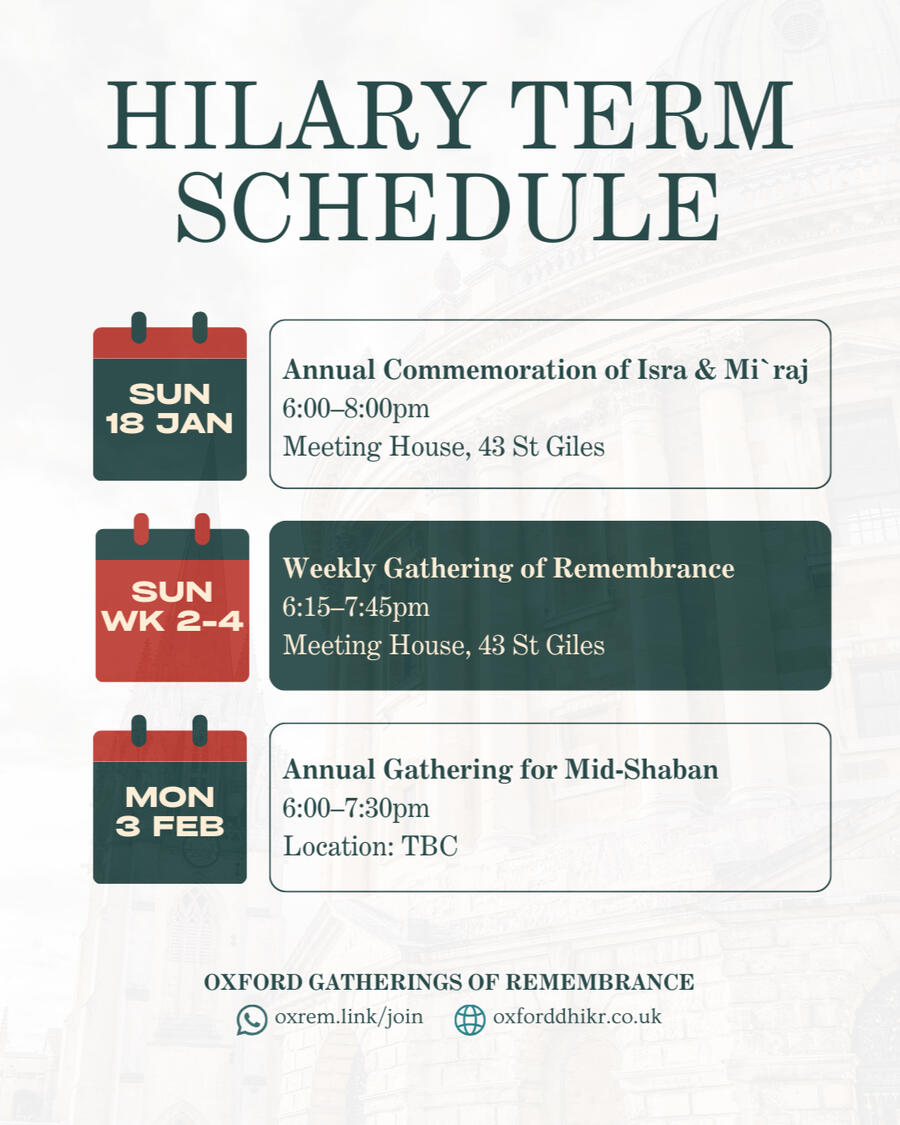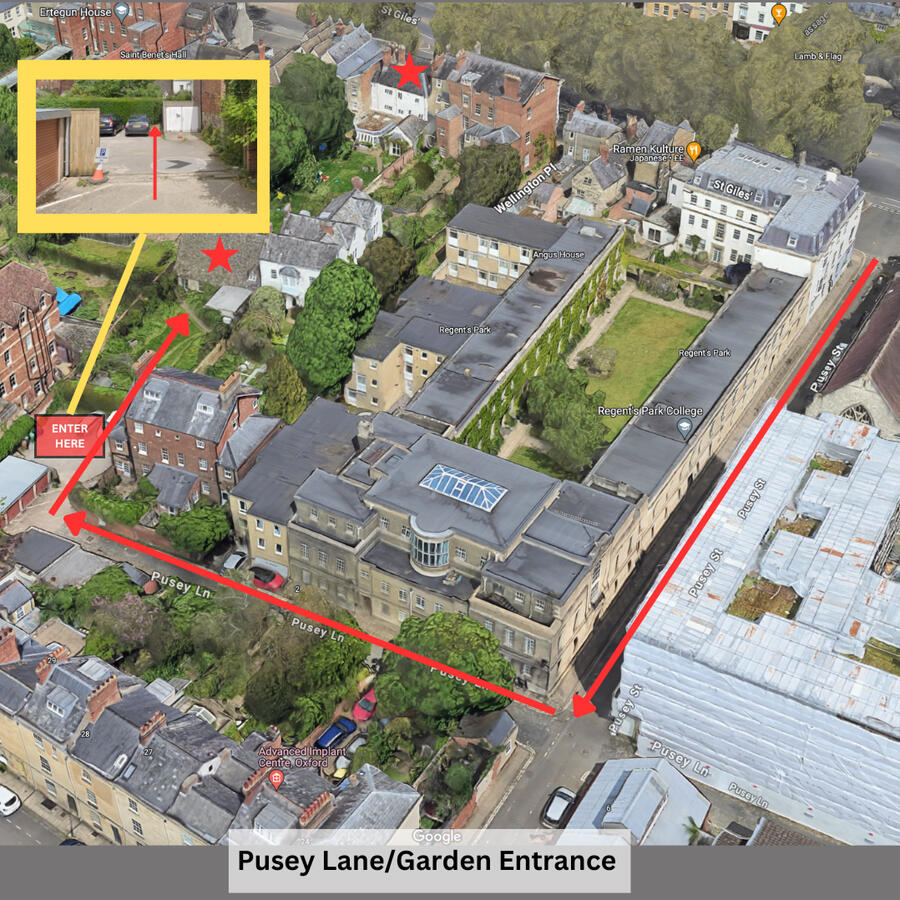Oxford Gatherings of Remembrance
Oxford Gatherings of Remembrance is a society of university and community members gathering every Sunday during term time to share in dhikr (remembrance of God), poetry, and the study of classical texts of Islamic spirituality. We also commemorate nights of sacred merit in the Muslim calendar.Our termly schedule is published below. You may also join our WhatsApp announcement group to receive announcements.
HILARY TERMCARD 2026 (Jan - Feb)
Please note that the term will be shorter this year due to the beginning of Ramadan in February.

(For directions to the rear entrance of the Quaker Meeting House go here)
If coming from St Giles (on foot), proceed down Pusey Street. Take the first right, Pusey Lane, until you reach the garages. On your right will be a large wooden door. Proceed ahead, through the small wooden garden door and around to the building entrance.

EVE OF THE MID-SHABAN (NISF SHABAN)
The 15th night of the Islamic month of Sha’ban, also known as the Eve of Mid-Shaban, is a night of great virtue and merit in the Islamic calendar and one of the most important nights of the year. Numerous reports on its virtues and blessings have been transmitted from the Holy Prophet ﷺ, the companions, and the earliest generations. Scholars and jurists from every generation and across the four traditional schools of law have concluded that this is a night that deserves special devotion. For this reason, the vast majority of Muslim societies of past and present commemorated this night with different forms of devotional acts.The Holy Prophet ﷺ said: “God looks upon His creation on the eve of the 15th of Shaban and grants them forgiveness except two: one who harbours rancour in the heart and one who unjustly takes the life of another person."1 In some variations of this hadith a third exception — one who breaks family ties — is mentioned.He ﷺ also said: “God, the Glorious and Exalted, descends to the nearest heaven on the eve of mid-Shaban and grants forgiveness to more people than the number of hairs on the hides of the sheep of the tribes of Kalb.”2Ibn Rajab al-Hanbali, in his renowned book on the merits of different nights and months, Lata’if al-Mara'if, says "A believer must free himself on that night [15th Shaban] for God's remembrance and prayer for the forgiveness of sins, concealment of flaws and deliverance from troubles. He should precede this with repentance and turning to God, for God turns to the one who repents."There are no specific devotional acts (ibadat) that have been prescribed for this night in particular. However, that does not preclude the option for one to do different devotional acts of their own choosing during the night as long as it is recognised that they are optional. The scholars of Islam from the four traditional schools have never disagreed on this matter.3 For this reason, different communities around the world have given emphasis to a variety of deeds, such as the recitation of Quran, salawat upon the Prophet Muhammad ﷺ, prayer, and supplication. In the holy lands of Makka and Madina a particular historical tradition has been to recite Surat Ya-Sin with three different intentions that correspond to the merits and significance of the night.In our observation of this holy night we continue these devotional traditions and recite Surat Ya-Sin with intentions for a blessed life, the deflection of tribulations, and reliance upon God and a good ending, sing traditional songs and poems, and close with a supplication.1 As cited by Imam Ahmad in the Musnad, al-Tabarani in the Mu'jam, Ibn Majah, Ibn Hibban, al-Haythami, and numerous other sources.
2 As cited in Ahmad, Tirmidhi, Ibn Majah.
3Note that councils of muftis (experts authorised and qualified to issue religious edicts) from the UAE, Jordan, and Egypt have issued official fatwas in the recent past on this matter.
THE SHARĪʿA PERMISSIBILITY OF COMMEMORATING THE DAY OF ARAFA FOR NON-PILGRIMS
It has long been an established practice in Muslim societies across the world to emulate the pilgrims at ʿArafāt by gathering for the remembrance of Allah (dhikr) and supplication (duʿāʾ) on the Day of ʿArafah. This practice rests upon a sound and recognised basis in the sacred law, as affirmed by qualified jurists, notwithstanding the objections raised by some scholars. According to principles of Islamic legal theory (uṣūl al-fiqh), when a matter is subject to a valid difference of opinion, it is impermissible to categorically declare it to be erroneous or religiously invalid.Four opinions can be discerned in the books on gathering for Arafa for non-pilgrims:1. Recommendation
It is recommended (mustaḥabb) to gather on this day.
This was a position of Imam Aḥmad, as clarified by Ibn Taymiyya in al-Mardāwī's al-Inṣāf (authored in the 9th hijri century).2. Permissibility
It is allowed to gather, without any dislike.
This is the view of many of the companions and the generation that proceeded them, including the renowned jurists Abu Yusuf and Muḥammad ibn al-Ḥasan.3. Dislike (Karāha)
It is disliked to gather. This is reported by Imām al-Nawawī, Ḥammād, and al-Qurtubī.4. Prohibiton
It is is prohibited to gather. This was the view of Imam al-Ṭurṭūshi (a Maliki scholar).Those who recommend or permit the gathering and those who dislike or prohibit it have evidences to support their positions. As our legal theory dictates, matters of scholarly disagreement do not make a matter unequivocally prohibited, hence it is permitted to undertake it without any concern that one is engaging in a prohibited action.As for us, we gather in the hope and anticipation of Allah’s generosity and grace: “Whoever resembles a people is of them” (Sunan Abu Dawūd).